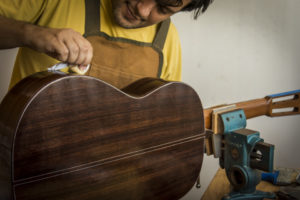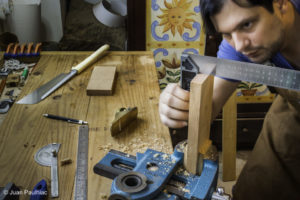Hello and welcome. I decided to start writing this blog because one of the things I enjoy the most, apart from making guitars, is talking about guitars. Of course, I enjoy conversations much more, but I also enjoy writing about my thoughts, opinions, how I work, etc... For the time being, this will do just fine.
I have never been a writer - please bear with me - and the subject for my first blog post had me thinking for a while. I finally settled on writing something about hand made guitars vs factory guitars. It is a great starting point because this is usually the first big decision a serious guitarist has to make when looking to buy a guitar. Actually, I think that this subject is important and deep enough to deserve more than one blog entry.
This is not a straightforward and easy subject. In fact, it can get hairy at times. And, as all things guitar related, there are no right/wrong, black/white answers. In the end it is you who decides on what point of the spectrum you stand. My intention here is to provide some views on the subject that will hopefully get you to think and analyze this issue in a critical manner.
The first big question lies in the definition itself: what is a factory guitar? What is a hand made guitar? Here, we need to make some broad generalizations, but again there are a lot of gray areas in between. Is a small guitar factory with 30 workers putting out small numbers of guitars the same as a huge Asian manufacturing plant that spits out thousands of guitars a day? They are both factories, but definitely not the same. For this analysis, I will define factory made guitars as guitars made in large facilities that optimize production by using automatization, series production, and job specialization as much as possible. And I will define hand made guitars as those made in a very small shop, where one, or a very small number of workers, make every aspect of every guitar from start to finish, using mostly hand and/or power tools.
So what implications do these differences - if any - really have on the guitars themselves? Are factory guitars actually that different from hand made ones? A significant number of differences arise from what a factory or a luthier wants to achieve with their guitars. These concerns will, in turn, govern most design, manufacturing, and even aesthetic choices made by them. It shouldn't surprise anyone that a luthier's priorities will most certainly be drastically different from a factory's priorities.
Price is perhaps the biggest implication of the whole factory vs hand made concern. Again, I am only generalizing, but hand made guitars tend to be much more expensive than their factory made counterparts. This is not surprising; the economies of scale apply to guitar making as much as any other venture. Not only that, job specialization, manufacturing in countries with low-cost labor, and the ever-evolving technological assets allow industries to produce instruments at price points that are virtually impossible for individual luthiers to match. Why, then, would somebody want to buy a hand made guitar? The simple fact that it is made by a craftsman just won't do. A hand made guitar has to offer more to the musician than just a "hand made" label; it has to offer something that justifies paying the additional price, and that no other guitar can offer.
Let's get one thing out of the way: I do not think that hand made guitars are inherently better or worse than factory guitars; it all depends on what you need from a guitar. There are good hand made guitars and bad hand made guitars. The same goes for factory guitars. But apart from that, they answer different requirements of what quality means. For example, factory guitars tend to be more robust, resistant, and stable than hand made guitars. For a factory, one important quality requirement is minimum warranty claims, so their guitars need to be built accordingly. Since they produce such large numbers of instruments, variations in wood properties from piece to piece, variations due to manufacturing tolerances, etc. need to be accounted for by overbuilding their instruments.
Some guitarists need a guitar they can take everywhere; a guitar they can use to have a great time with family and friends; a guitar they can always have at hand without fear of it being damaged; a guitar that doesn't require extra special care. A hand made guitar would rarely fit this bill. Most factory guitars are very durable, relatively resistant to temperature and humidity changes, and have incredibly tough finishes, which makes them suitable for this type of use. This comes at an expense, though. A sturdier build, the use of more stable materials (like plywoods or thicker pieces of wood) and thicker, harder, more resistant finishes, usually take a toll on the overall sound of the instrument. They can still sound decent, and for a musician playing in a loud ensemble with other instruments, the tradeoff may be worth the while.
A luthier that hand makes guitars would probably never be burdened with corporate concerns and statistics. Hand making instruments in very small numbers allows a luthier to work each guitar and each piece of wood individually, varying his approach to account for the natural variation that exists from one piece of wood to the other. A luthier is usually concerned with producing the best sounding, best playing, best looking guitar he can make, no compromises. This usually results in a guitar that is much more expressive and better sounding - and in general terms with a better build quality - but which is significantly more delicate, requiring extra care. A solo musician like a classical guitarist, or a musician playing with a small group of instruments at medium to lower volumes, might find the expressive qualities of such an instrument essential for his playing. They can also be a must for certain types of professional recordings and certain styles of music. If you just want the best possible sound, expression, and feel you can find in an instrument, you should start by looking at luthier made guitars.
This begs the question: what is a good sounding guitar? What is an expressive guitar? This is a whole subject in itself, perhaps much more extensive and complex than the whole factory vs hand made debate. This is definitely a subject to explore in detail on future entries, but for the time being, I will just mention that sound, tone, colors, expressiveness, etc. are all vague and elusive concepts. They are difficult to define, almost impossible to measure, and depend enormously on our human condition. Our perception of them depends on our expectations, biases, cultural background, the volatility of human perception, the context in which they are analyzed... even on our mood at the time. They also depend on how much and how well we have educated our listening skills. And, of course, there are different kinds of aesthetic concepts and requirements depending on the type of music, the type of player, and last but not least, his personal taste. But the fact that something is abstract, elusive and unreliable does not mean it is not real.
So far we have taken a glimpse of how the most obvious differences between a guitar making factory and a luthier workshop necessarily lead to big differences in their philosophies and how they approach their guitar making process. And in turn, how these have a direct influence in practically every design and manufacturing decision they make. Pretty surprising! In the next blog entry, I will discuss other ramifications that stem from this distinction.
Thanks for staying with me so far! Until next time, goodbye and stay safe.



Muchas gracias – una perspectiva muy justa y equilibrada, la mejor que nunca he visto – no queda más que decir. Escribes muy bien y además perfectamente en inglés – enhorabuena! Saludos desde España.
Tomás, muchas gracias por haber leído el artículo, y por tus amables comentarios. Me encanta que lo hayas disfrutado. Saludos!